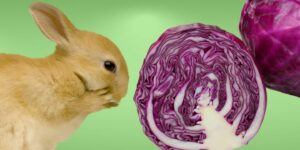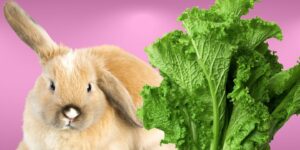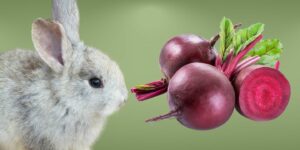Yes, rabbits can eat vegetables. In fact, vegetables should make up a significant portion of a rabbit's diet, as they provide essential nutrients and help keep a rabbit's teeth healthy. However, it's important to feed vegetables to rabbits in the right way and in the appropriate amounts.
Benefits of Feeding Vegetables to Rabbits
Vegetables are an important source of nutrients for rabbits, including fiber, vitamins, and minerals. They also help keep a rabbit's teeth healthy by providing natural wear through chewing. Some vegetables are particularly high in certain nutrients and can be particularly beneficial for rabbits. For example, leafy greens like lettuce, kale, and spinach are high in vitamins A and C and can help rabbits maintain healthy eyes and skin. Carrots, which are high in beta-carotene, can help support a healthy digestive system.
How to Feed Vegetables to Rabbits
When introducing new vegetables to a rabbit's diet, it's important to do so gradually to allow the rabbit's digestive system to adjust. Start by offering a small amount of the new vegetable and gradually increase the amount over the course of a week or two. It's also important to offer a variety of vegetables to ensure that rabbits are getting a balanced diet.
In general, rabbits should be fed about 1-2 cups of fresh vegetables per day. However, the exact amount will depend on the rabbit's size, age, and activity level. It's important to monitor a rabbit's weight and overall health and adjust the amount of vegetables accordingly.
Foods to Avoid
While most vegetables are safe for rabbits to eat, there are a few that should be avoided. These include avocado, potato, rhubarb, and tomato plants (the fruit is okay in moderation). These foods can be toxic to rabbits and can cause serious health problems. It's also important to avoid feeding rabbits processed or sugary foods, as these can lead to weight gain and other health issues.
Safe Vegetables for Rabbits
Leafy Greens
Types of Leafy Greens
Some safe leafy greens for rabbits include lettuce (romaine, green leaf, red leaf), kale, spinach, arugula, cilantro, parsley, and collard greens.
Nutritional Benefits of Leafy Greens
Leafy greens are high in vitamins A and C, which can help rabbits maintain healthy eyes and skin. They also contain essential minerals like calcium and iron.
How to Feed Leafy Greens to Rabbits
When feeding leafy greens to rabbits, make sure they are fresh and washed thoroughly. You can offer a mix of different leafy greens to provide variety in the diet.
Root Vegetables
Types of Root Vegetables
Some safe root vegetables for rabbits include carrots, parsnips, and turnips. However, these should be fed in moderation due to their higher sugar content.
Nutritional Benefits of Root Vegetables
Root vegetables, such as carrots, are high in beta-carotene, which can help support a healthy digestive system.
How to Feed Root Vegetables to Rabbits
Root vegetables should be washed and chopped into small, manageable pieces before being fed to rabbits. Due to the higher sugar content, only feed small amounts to avoid weight gain and digestive issues.
Other Vegetables
Types of Other Vegetables
Rabbits can also enjoy other vegetables like bell peppers, broccoli, cauliflower, and zucchini.
Nutritional Benefits of Other Vegetables
These vegetables provide additional vitamins and minerals, as well as fiber, to help support a balanced diet.
How to Feed Other Vegetables to Rabbits
Like with leafy greens and root vegetables, ensure these vegetables are fresh, washed, and chopped before feeding them to your rabbit.
How to Choose and Prepare Vegetables for Rabbits
Selecting Fresh and High-Quality Vegetables
When shopping for vegetables for your rabbit, choose fresh, high-quality produce free from any signs of mold or decay.
Washing and Preparing Vegetables for Feeding
Before feeding vegetables to your rabbit, wash them thoroughly to remove any pesticides or contaminants. Chop the vegetables into small, manageable pieces for your rabbit to eat.
Storing Vegetables for Optimal Freshness
To keep vegetables fresh, store them in the refrigerator in a sealed container or plastic bag. Always check the freshness of the vegetables before feeding them to your rabbit.
Feeding Guidelines and Schedule for Rabbits
Determining the Right Amount of Vegetables
Rabbits should be fed about 1-2 cups of fresh vegetables per day, depending on their size, age, and activity level. Monitor your rabbit's weight and health and adjust the amount of vegetables accordingly.
Introducing New Vegetables to a Rabbit's Diet
When introducing new vegetables to a rabbit's diet, start with small amounts and gradually increase the amount over a week or two.
Monitoring Your Rabbit's Health and Adjusting Their Diet
Regularly monitor your rabbit's health, weight, and eating habits, and adjust their diet as needed. Consult with a veterinarian if you have concerns about your rabbit's diet or health.
Vegetables to Avoid and Potential Risks
Toxic Vegetables for Rabbits
Avoid feeding your rabbit avocado, potato, rhubarb, and tomato plants, as these can be toxic to rabbits.
Overfeeding and Weight Gain
Be cautious not to overfeed your rabbit, as this can lead to weight gain and other health issues. Monitor their weight and adjust their diet as needed.
Incompatible Vegetables for Rabbits with Specific Health Conditions
If your rabbit has specific health conditions, consult with a veterinarian to determine which vegetables may not be appropriate for their diet.
Frequently Asked Questions about Rabbits and Vegetables
Can Rabbits Eat Fruit?
Yes, rabbits can eat fruit, but it should be given sparingly due to the high sugar content.
What if My Rabbit Doesn't Like Vegetables?
Try offering a variety of vegetables to see which ones your rabbit prefers. Consult with a veterinarian for guidance on addressing any potential dietary issues.
Can Rabbits Eat Cooked Vegetables?
No, it is best to feed rabbits raw, fresh vegetables.
Conclusion
In conclusion, rabbits can and should eat vegetables as part of a balanced diet. By offering a variety of vegetables in the right amounts, rabbit owners can help ensure their pets are getting the nutrients they need to stay healthy and happy.











